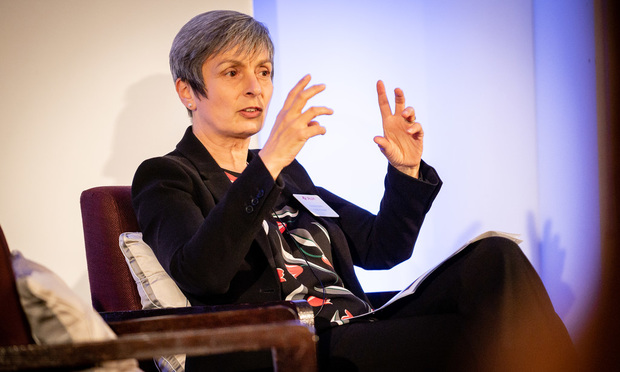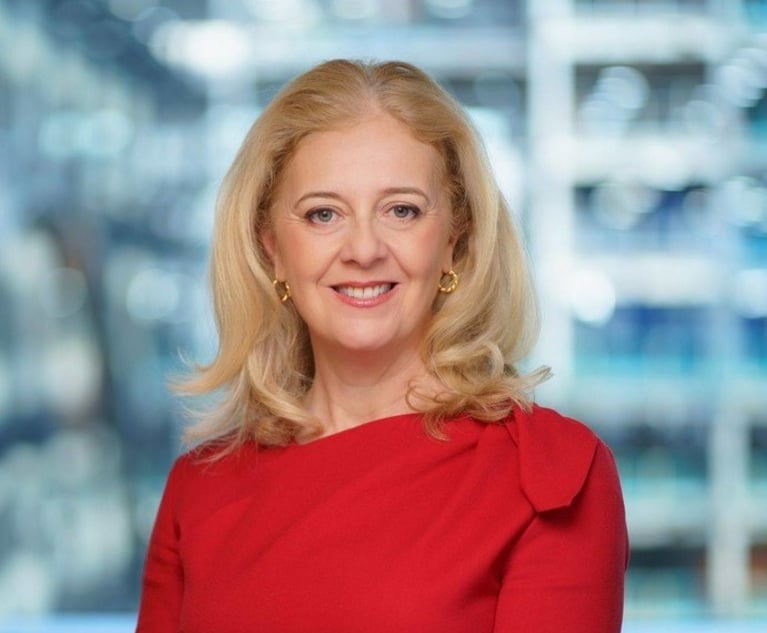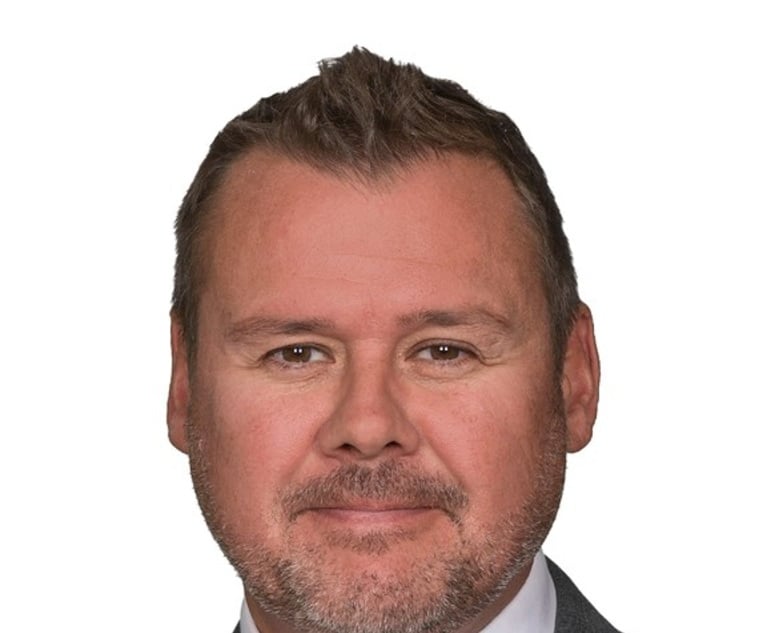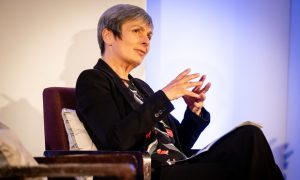'Beautiful Craftsmen' – Vodafone GC Names the Firm She'd Never Want to Be Up Against
Vodafone group general counsel Rosemary Martin reveals which firms have impressed her and what advisers can do to get in her good books
April 03, 2019 at 06:09 AM
6 minute read
 Rosemary Martin, Vodafone, at the Global Independent Law Firms Forum, 2019
Rosemary Martin, Vodafone, at the Global Independent Law Firms Forum, 2019
Slaughter and May are "beautiful craftsmen" who appear on Vodafone's legal panel "without debate", its group general counsel has revealed in a frank interview about what she looks for in her advisers.
Speaking at Legal Week's Global Independent Law Firms Forum in London last week, Rosemary Martin spoke very highly of the magic circle firm, which she also instructed when she led the legal team at Reuters almost a decade ago.
Talking about veteran Slaughters partner Nigel Boardman, Martin said: "It's about the way they think, and their intellectual capacity to think. When you're really up against it, you need someone who can think differently if necessary.
"I always said I'd rather have Slaughter and May with me, and I certainly don't want them against me."
She describes herself as "old fashioned", and appreciates how well Slaughters draft their legal documents: "Slaughters are beautiful craftsmen. If you want it perfectly drafted and executed, they're excellent."
She added: "Linklaters had been an adviser to Vodafone for many years. So that was two [panel] slots filled without debate."
"I always said I'd rather have Slaughter and May with me, and I certainly don't want them against me"
The telecoms giant reviewed its panel in early 2018, with Slaughter and May, Linklaters, Hogan Lovells, Norton Rose Fulbright and Osborne Clarke all keeping their places, and DLA Piper and Eversheds Sutherland being dropped. Squire Patton Boggs and Wiggin took their place.
Outside of the first two names on the list for Martin, the panel took some tweaking. Martin said she initially had "one firm too many" among the middle-tier firms.
According to Martin, one former legal adviser to the company had claimed to be able to do more international work than it was actually capable of. Martin said in the end, "they were not winning the mandate for cases and matters they wanted, and they felt they were investing too much in us and not getting enough in return".
 Rosemary Martin
Rosemary MartinIn general, Martin appreciates firms that "invest more than just chargeable time with us", which she hoped a slimmed-down panel would help with.
Another panel firm to have impressed Martin is Osborne Clarke, which introduced Martin to a piece of legal technology produced by software company HighQ.
"Osborne Clarke came to us with a really nice platform for real estate work that quickly turned into something our facilities managers, then our surveyors, then our real estate agents were using"
"We really want our law firms to help us think how we do our work internally. Osborne Clarke came to us with a really nice platform for real estate work that quickly turned into something our facilities managers, then our surveyors, then our real estate agents were using."
She said the HighQ platform was a "fabulous tech solution that really helped us as a business". HighQ most recently took a spot in Allen & Overy's legal tech programme, Fuse.
Martin outlined a few initiatives that she particularly appreciates from her advisers, saying there's "real value" in providing flexible billing. She said she picks out one of her panel firms for being "excellent" at "pricing generously" on high-profile matters and then downplaying fees on "something less strategic".
Martin said she's also "extra grateful" to law firms that provide training and offer services such as covering in-house maternity leave and various absences, which she described as "one of the best ways to build a relationship with a client".
She said she is open to alternative legal service providers, and is "really pleased" to see some law firms adopt managed legal services in recent years. Vodafone has historically used Axiom, with Martin saying that its lawyers have been "really valuable to us".
Vodafone had used UK managed legal services provider Riverview in the past, but had to drop the company after it was bought by EY due to a conflict, as it acts as Vodafone's auditor.
Martin is keen to keep the legal work in-house whenever possible so that her team can build up their own knowledge reserves.
"For something like data privacy or GDPR, we'll want to build that experience in-house"
This is particularly true for new, developing legal areas where knowledge can be at more of a premium – for example, around new technologies such as blockchain or the internet of things. She also cited the danger of using an external law firm that can take what they've learned and help clients that are possible competitors of Vodafone.
She said: "For something like data privacy or GDPR, we'll want to build that experience in-house. Clearly it's a massive topic for Vodafone and we want to build our understanding of the law ourselves."
Since arriving from Reuters just under a decade ago, Martin has transformed the way Vodafone manages its legal operations by taking a chainsaw to its legal panel, cutting its size from more than 70 firms to now just seven, streamlining its internal operations, and pushing the use of tech across the team.
In recent months, the Vodafone legal team has agreed to work with legal tech companies through Slaughter and May's Collaborate initiative, and has also taken a seat on the government-backed LawTech Delivery Panel.
Martin said her efforts have shown results on the company's bottom line: "Our CEO looked at our figures and said: 'Four hundred and fifty of you contribute financially about the same as one of our mid-size subsidiaries – which are made up of about 2,000 people.'
"For me that's the real measure of success – do the board and executive committee value what we do and feel the value of it?"
This content has been archived. It is available through our partners, LexisNexis® and Bloomberg Law.
To view this content, please continue to their sites.
Not a Lexis Subscriber?
Subscribe Now
Not a Bloomberg Law Subscriber?
Subscribe Now
NOT FOR REPRINT
© 2025 ALM Global, LLC, All Rights Reserved. Request academic re-use from www.copyright.com. All other uses, submit a request to [email protected]. For more information visit Asset & Logo Licensing.
You Might Like
View All
Jenner & Block Expands London Team with Baker McKenzie Hire to Lead New Practice Area
2 minute read
Bennett Jones Securities Partner Alan Gardner Remembered as a Brilliant Lawyer & Mentor
3 minute read
Freshfields Leads European M&A Rankings Again in 2024, as U.S. Firms Gain Market Share
5 minute read
HSF Defends Bayer on Roundup Class Action as Litigation Comes to an End in Australia
2 minute readTrending Stories
- 1iRobot Picks Up Law Firm Partner as New Legal Chief
- 2Baker McKenzie Spins Off AI-Powered Risk Management Tool SCOREalytics as Independent Business
- 3Edison Hit With Lawsuits Over Devastating Eaton Fire in Los Angeles
- 4Does Society’s Focus on Children’s Sexuality Make Them Vulnerable to Grooming?
- 5California Lawmakers Reach $50M Deal to Fund Legal Fights Against Trump
Who Got The Work
Michael G. Bongiorno, Andrew Scott Dulberg and Elizabeth E. Driscoll from Wilmer Cutler Pickering Hale and Dorr have stepped in to represent Symbotic Inc., an A.I.-enabled technology platform that focuses on increasing supply chain efficiency, and other defendants in a pending shareholder derivative lawsuit. The case, filed Oct. 2 in Massachusetts District Court by the Brown Law Firm on behalf of Stephen Austen, accuses certain officers and directors of misleading investors in regard to Symbotic's potential for margin growth by failing to disclose that the company was not equipped to timely deploy its systems or manage expenses through project delays. The case, assigned to U.S. District Judge Nathaniel M. Gorton, is 1:24-cv-12522, Austen v. Cohen et al.
Who Got The Work
Edmund Polubinski and Marie Killmond of Davis Polk & Wardwell have entered appearances for data platform software development company MongoDB and other defendants in a pending shareholder derivative lawsuit. The action, filed Oct. 7 in New York Southern District Court by the Brown Law Firm, accuses the company's directors and/or officers of falsely expressing confidence in the company’s restructuring of its sales incentive plan and downplaying the severity of decreases in its upfront commitments. The case is 1:24-cv-07594, Roy v. Ittycheria et al.
Who Got The Work
Amy O. Bruchs and Kurt F. Ellison of Michael Best & Friedrich have entered appearances for Epic Systems Corp. in a pending employment discrimination lawsuit. The suit was filed Sept. 7 in Wisconsin Western District Court by Levine Eisberner LLC and Siri & Glimstad on behalf of a project manager who claims that he was wrongfully terminated after applying for a religious exemption to the defendant's COVID-19 vaccine mandate. The case, assigned to U.S. Magistrate Judge Anita Marie Boor, is 3:24-cv-00630, Secker, Nathan v. Epic Systems Corporation.
Who Got The Work
David X. Sullivan, Thomas J. Finn and Gregory A. Hall from McCarter & English have entered appearances for Sunrun Installation Services in a pending civil rights lawsuit. The complaint was filed Sept. 4 in Connecticut District Court by attorney Robert M. Berke on behalf of former employee George Edward Steins, who was arrested and charged with employing an unregistered home improvement salesperson. The complaint alleges that had Sunrun informed the Connecticut Department of Consumer Protection that the plaintiff's employment had ended in 2017 and that he no longer held Sunrun's home improvement contractor license, he would not have been hit with charges, which were dismissed in May 2024. The case, assigned to U.S. District Judge Jeffrey A. Meyer, is 3:24-cv-01423, Steins v. Sunrun, Inc. et al.
Who Got The Work
Greenberg Traurig shareholder Joshua L. Raskin has entered an appearance for boohoo.com UK Ltd. in a pending patent infringement lawsuit. The suit, filed Sept. 3 in Texas Eastern District Court by Rozier Hardt McDonough on behalf of Alto Dynamics, asserts five patents related to an online shopping platform. The case, assigned to U.S. District Judge Rodney Gilstrap, is 2:24-cv-00719, Alto Dynamics, LLC v. boohoo.com UK Limited.
Featured Firms
Law Offices of Gary Martin Hays & Associates, P.C.
(470) 294-1674
Law Offices of Mark E. Salomone
(857) 444-6468
Smith & Hassler
(713) 739-1250









